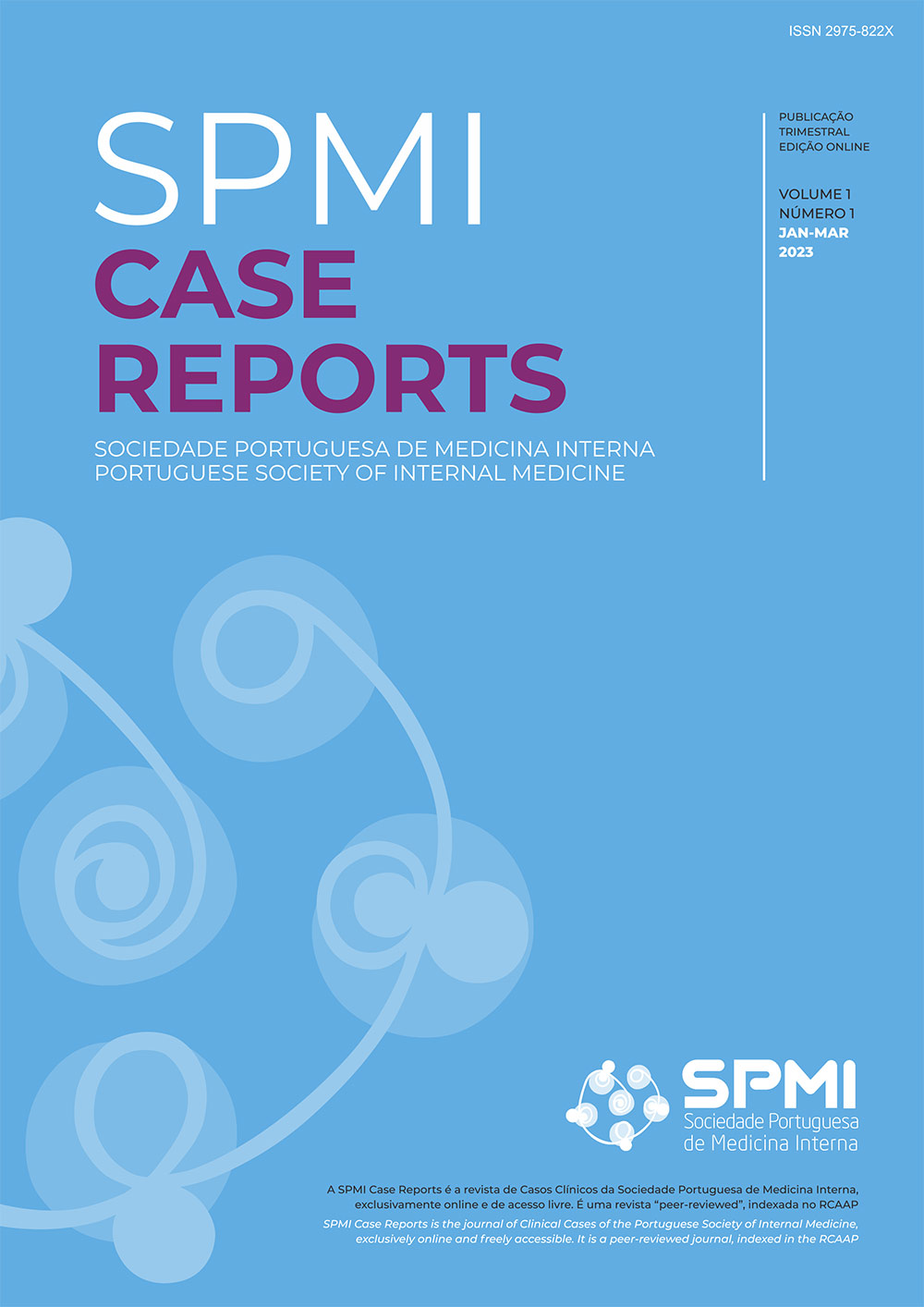Post-Infectious Rhombencephalitis and Myelitis: Description of a Clinical Case
DOI:
https://doi.org/10.60591/crspmi.9Keywords:
Campylobacter jejuni, Encephalitis Viral, Muscle Weakness, Myelitis, RhombencephalonAbstract
Myelitis and rhombencephalitis are caused by inflammation of the spinal cord and romboencephalus, respectively. With a diverse presentation, clinical history, cerebro-spinal fluid (CSF) analysis and neuroimaging can help in its identification.
We report a case of a 47-years-old man with personal history of hyperuricemia and dyslipidaemia, who came to emergency department with a three days evolution of muscular weakness. He had started watery diarrhea and fever 7 days before.
Neurological examination showed poor speech, decomposition of eyes movement, unidirectional nystagmus to the left, upper vertical and horizontal to the right diplopia, facial diparesis, paresis of right upper limb (grade 4), left upper limb (grade 3) and both lower limb (grade 2), right lower limb areflexia, glove hypoesthesia by the middle third of the right forearm and by the left elbow and urinary retention.
Blood tests showed leucocytosis and increased C-reactive protein. Brain computed tomography scan had no changes. Lumbar puncture was performed with normal pressure and clear CSF, leukocytes with mononuclear predominance and high grade of proteins. He started two antibiotics and one antiviral. Brain and spinal cord magnetic resonance imaging showed alterations compatible with brain and medullary involvement with possible inflammatory or metabolic nature. He started high-dose steroid therapy followed by plasma exchange with practically complete improvement. The blood serologic panel revealed anti-Campylobacter jejuni IgM antibodies.
Para-infectious myelitis and rhombencephalitis secondary to Campylobacter jejuni infection are rare and pathophysiology is not yet fully clarified. Its identification and prompt treatment are crucial for prognosis.
Downloads
References
Lopez Chiriboga S, Flanagan EP. Myelitis and other autoimmune myelopathies. Continuum. 2021;27:62-92. doi: 10.1212/CON.0000000000000900.
Cleaver J, James R, Rice CM. Rhomboencephalitis. Pract Neurol. 2021;21:108–18.
Beh SC, Greenberg BM, Frohman T, Frohman EM. Transverse myelitis. Neurol Clin. 2013;31:79-138. doi: 10.1016/j.ncl.2012.09.008
Rodríguez Y, Rojas M, Pacheco Y, Acosta-Ampudia Y, Ramírez-Santana C, Monsalve DM, et al. Guillain-Barré syndrome, transverse myelitis and infectious diseases. Cell Mol Immunol. 2018;15:547-62. doi: 10.1038/cmi.2017.142.
Young V, Quaghebeur G. Transverse Myelitis and Neuromyelitis Optica Spectrum Disorders. Semin Ultrasound CT MR. 2016;37:384-95. doi: 10.1053/j.sult.2016.05.004.
Baar I, Jacobs BC, Govers N, Jorens PG, Parizel PM, Cras P. Campylobacter jejuni-induced acute transverse myelitis. Spinal Cord. 2007;45:690-4. doi: 10.1038/sj.sc.3102012.
Goh C, Desmond PM, Phal PM. MRI in transverse myelitis. J Magn Reson Imaging. 2014;40:1267-79. doi: 10.1002/jmri.24563.
Gozzard P, Orr D, Sanderson F, Sandberg M, Kennedy A. Acute transverse myelitis as a rare manifestation of Campylobacter diarrhoea with concomitant disruption of the blood brain barrier. J Clin Neurosci. 2012;19:316-8. doi: 10.1016/j.jocn.2011.07.005.
Llamas Y, Hazel K, Nicholson P, Costelloe L. Longitudinally extensive transverse myelitis after Campylobacter jejuni enteritis. Pract Neurol. 2018;18:143-5. doi: 10.1136/practneurol-2017-001777.
Aberle J, Kluwe J, Pawlas F, Stellbrink HJ, Greten H. Severe myelitis following infection with Campylobacter enteritis. Eur J Clin Microbiol Infect Dis. 2004;23:134-5. doi: 10.1007/s10096-003-1073-5.
Gaig C, Valldeoriola F, Saiz A. Acute disseminated encephalomyelitis associated with Campylobacter jejuni infection and antiganglioside GM1 IgG antibodies. J Neurol. 2005;252:613-4. doi: 10.1007/s00415-005-0701-7.
Orr D, McKendrick MW, Sharrack B. Acute disseminated encephalomyelitis temporally associated with Campylobacter gastroenteritis. J Neurol Neurosurg Psychiatry. 2004;75:792-3. doi: 10.1136/jnnp.2003.013433.








